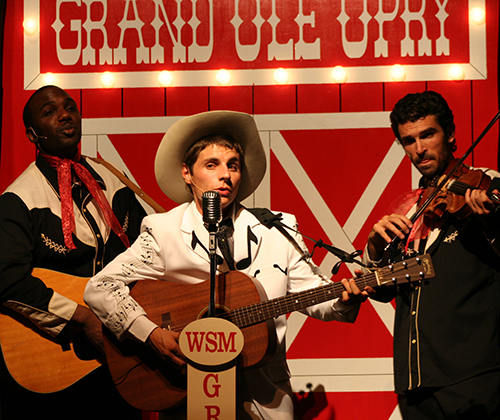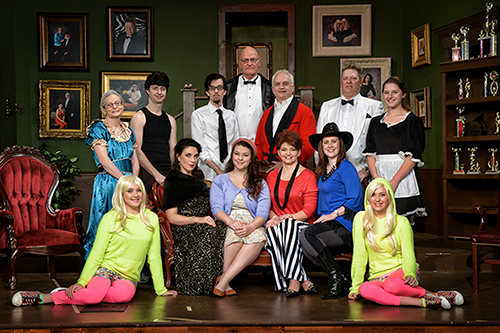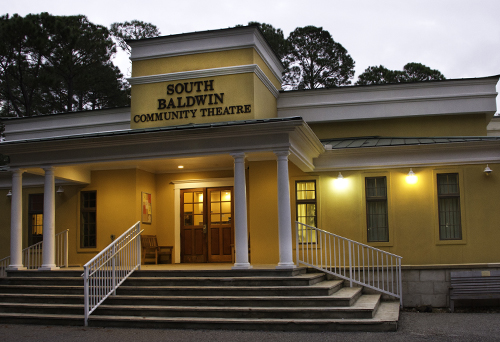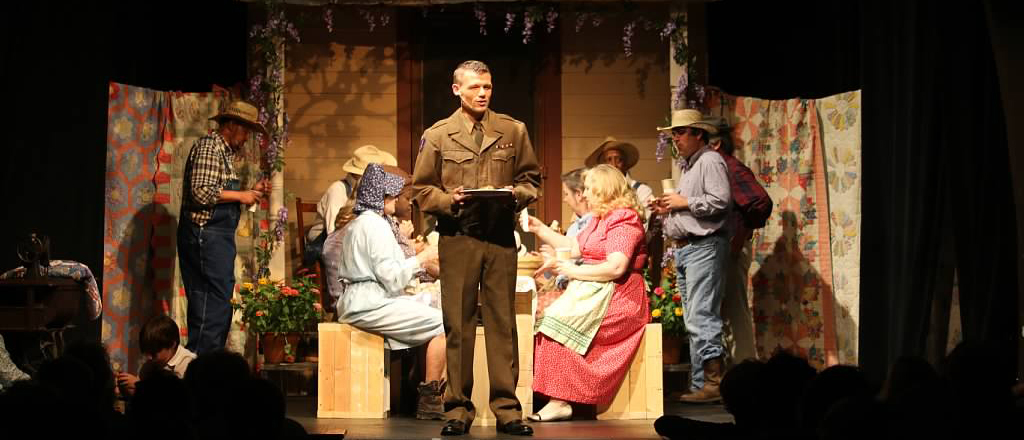Community theaters provide cultural opportunities for small towns
By Minnie Lamberth
The Red Door Theatre in Union Springs wraps up its 12th season this December with performances of “Always a Bridesmaid,” a comedy about four Southern women keeping a promise made on their prom night to be in each other’s weddings. As is common for community theaters in small towns across the state, an all-volunteer cast from the area will perform and the play itself will have a Southern focus.
 “Community theater is really alive and well in Alabama,” says Xan Morrow, chairperson of the Red Door Theatre Committee. “It’s really amazing how good it is.”
“Community theater is really alive and well in Alabama,” says Xan Morrow, chairperson of the Red Door Theatre Committee. “It’s really amazing how good it is.”
In Union Springs, the theater is operated by local folks who had a vision for creating cultural opportunities in this small town – as well as a desire to draw visitors for special events. In the early 2000s, The Tourism Council of Bullock County was seeking a vehicle to pull visitors to the community, Morrow explains. “We decided a community theater would be a way to do that.”
To make that happen, organizers needed a location, and they found a beautiful venue in the former Trinity Episcopal Church. Built in 1909, the building was donated to the City of Union Springs through an arrangement made by The Episcopal Diocese of Alabama and is used for theatrical performances. The pews and stained glass windows are still there, though upgrades have been made in restroom additions and air conditioning.
Organizers also needed the right production. Working in concert with the Troy University Foundation, they were able to commission a play, “Conecuh People,” based on an autobiographical book by Troy graduate and Bullock County native Wade Hall. Barbour County native Ty Adams wrote the play. When the script was completed, Troy’s Department of Theatre and Dance presented the inaugural production. After that, Morrow says, “It became ours for seven years. That became our play.”
The initial presentation was in 2004, and the Red Door continued to produce the play each spring until 2010. After a hiatus, Morrow says, “We did it this year for the first time in five years.”
The Red Door puts on four different productions each year. Whether or not “Conecuh People” is in the offerings, all plays have a Southern emphasis. The productions are “celebrating our heritage, our culture, our future,” Morrow says. “Everything is connected to where we live.”
7,000 community theaters across the U.S.
Julie Crawford of the American Association of Community Theaters says cultural opportunities of this kind are important in small towns. “There are about 7,000 community theaters across the country,” Crawford says. “Very few are in the big urban areas. They’re in the suburban or rural areas.”
Community theaters are often one of few opportunities to participate in the arts, she notes. “People want them and that’s why they support them,” she says.
The community theater provides different opportunities – not just for the audience but the opportunity to get involved in the production. Often parents and children participate together. “It’s artistic outlet and a way to give back to the community,” she says. “In a small town, you often know somebody on stage. It’s a neighborly kind of thing, too.”
A repurposed building in Red Bay
 In northwest Alabama, in the small town of Red Bay, the vision for a community theater came in part from local bank officials. In the 1990s, what is now Community Spirit Bank had taken possession of a foreclosed property in the middle of town. A six-lane bowling alley was on one side, a movie theater on the other.
In northwest Alabama, in the small town of Red Bay, the vision for a community theater came in part from local bank officials. In the 1990s, what is now Community Spirit Bank had taken possession of a foreclosed property in the middle of town. A six-lane bowling alley was on one side, a movie theater on the other.
“The bank was trying to do something the community could use,” says Scotty Kennedy of the Bay Tree Council for the Performing Arts. The building was repurposed, and as a result, Community Spirit Bank’s Weatherford Centre became a community gathering place with banquet facilities on one side and live theater on the other.
“It’s been wonderful for our community to open the door to live theater,” says Tammy Montgomery, Community Spirit’s chief operating officer. “We’d never had that in Red Bay before.” Her father, Billy Bolton, is the bank’s chairman and was instrumental in the bank’s decision. As former mayor, “He always had a vision for our community,” Montgomery says.
Red Bay produces three productions a year, scheduled for a Thursday through Sunday in the months of November, February and April. Local talent runs the show. “The director and ticket coordinator are paid, and so is the carpenter. Everyone else is volunteer,” Kennedy says. Board members help with tickets and concessions, while volunteers work with hair and makeup and paint the set. Given that banquet facilities are just on the other side of the building, some of these performances come with a meal.
“We mainly do comedies,” Kennedy says. “Dramas don’t go over well in our small town. It’s a very family-oriented production that we do.”
In Atmore, theater finds home in 100-year-old building
In Atmore, the Greater Escambia Council for the Arts holds its theater productions in a 100-year-old building that had previously been the site of a number of businesses, including a feed store, Ford dealership, grocery store and furniture store, before sitting empty for about five years. Again, a local bank, United Bank, made an offer. “The president of the bank contacted us to see if we had any interest in the building,” says Phil Johnson, artistic director for the council. “We said yes.”
The theater has been housed in the building for six years now, which has helped provide consistency for a group that for its first 10 years performed wherever a facility was available. “We figured we performed about 75 or 80 shows in about 75 or 75 or 80 locations,” Johnson says. “It got to the point where people couldn’t find us.”
The Atmore council produces six primary dramatic or musical performances during the year, Johnson says. “We’ve done everything from ‘I Do, I Do,’ which has a cast of two, to ‘Titanic’ which has a cast of 125.” He adds that council members once tried to count all the individuals who had been involved in casts. “We stopped counting at 400.”
Venue for young artists in Baldwin County

In Gulf Shores, the South Baldwin Community Theatre was able to build its own building on donated land about 25 years ago. Though initially located in Foley, the SBCT has been in continuous operation since 1972 and has produced hundreds of plays. All activities are conducted by volunteers.
“We have been very successful in our goal of providing community theater for Baldwin County and have been able to improve the theater facilities over time. This has enabled us to enhance the quality of the programs we offer, such as the YAS,” says Jan Hinnen, SBCT president.
The Young Artist Series is a way to give children the opportunity to participate in live theater, he explained. “They get good experience,” Hinnen says. This past season the SBCT has presented eight plays, three of which were in the Young Artist Series. Both genres include musicals and comedies. In addition, the adult shows include romantic comedies and mysteries.
Also noteworthy, the SBCT has a local playwright on its board, Laura Pfizenmayer. “We’ve done five of her plays,” Hinnen says. Some of her plays are being performed in other areas as well.
Alabama’s small town community theaters and organizations include:
- Auburn Area Community Theatre, Auburn – www.auburnact.org
- Bay Tree Council for the Performing Arts, Red Bay www.baytreecouncil.com
- The Canebrake Players, Demopolis – www.facebook.com/The-Canebrake-Players
- Chickasaw Civic Theatre, Chickasaw – www.facebook.com/ChickasawCivicTheatre
- Community Actors Studio Theatre, Anniston – www.castalabama.com
- The Covered Bridge Players, Oneonta – coveredbridgeplayers.com
- The Greater Escambia Council for the Arts, Atmore – www.gecarts.com
- Historic Ritz Theatre, Talladega – (venue for performing acts and movies)
- Millbrook Community Players, Millbrook – www.millbrooktheater.com
- Pastime Theatre/Self Express Productions, Winfield – www.facebook.comThePastimeTheatre (A movie theater, it hosts concert series and some plays)
- Red Door Theatre, Union Springs – www.reddoortheatre.org
- The Ritz Theater, Greenville – www.gaac-ritz.com
- South Baldwin Community Theatre, Gulf Shores – www.sbct.biz
- Southeast Alabama Community Theatre, Dothan – seact8.wix.com/seact
- Way Off Broadway Theatre, Prattville – www.prattvilleal.gov/departments/way-off-broadway-theatre.html
- We Piddle Around Theater, Brundidge – www.piddle.org
- Wetumpka Depot Players, Wetumpka – www.wetumpkadepot.com
- The Whole Backstage, Guntersville – wholebackstage.com
- [list icon=”star”]
[/list]
If you don’t see your local theatre group listed, let us know at [email protected].





